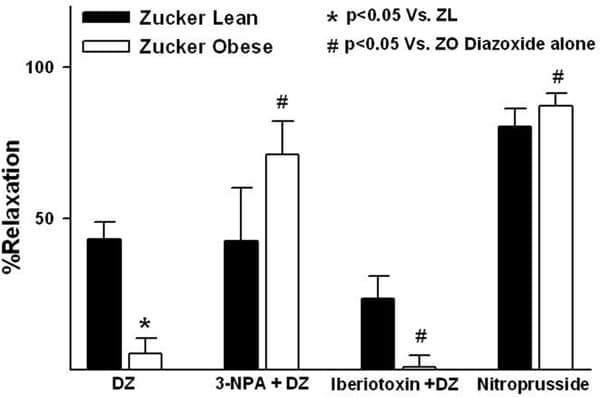Dilator responsiveness of cerebral arteries is selectively deranged in insulin resistance (Erdos et al., 2004; 2006). While the mechanisms involved are not fully explored, abnormal mitochondrial function may be involved (Katakam et al., 2007). Diazoxide (DZ), a mitochondrial ATP sensitive potassium channel activator, elicits arterial vasodilation by increasing the generation of mitochondria-derived reactive oxygen species (ROS) that stimulate Ca2+ sparks and Ca2+ activated K+ channels. We evaluated DZ induced vasodilation in isolated, pressurized cerebral arteries from Zucker obese (ZO) and lean (ZL) rats by videomicroscopy. The ZO rats were hyperinsulinemic but were not hyperglycemic or hypertensive. DZ induced vasodilation was diminished in ZO compared to ZL [Figure; 5±5% (n=12) versus 43±6%(n=12)]. 3-nitropropionic acid, a succinate dehydrogenase inhibitor and a promoter of mitochondrial ROS generation, had no effect on cerebral vasodilation in ZL (43± 17%; n=4), but enhanced DZ induced vasodilation to 71±11% (n=5) in ZO. DZ induced vasodilation was partially inhibited by iberiotoxin in ZL while it was totally abolished in ZO (Figure). ZO arteries exhibited reduced pressure-induced constriction compared to ZL. However, vasodilation to nitroprusside was similar in both ZO and ZL [87±4% (n=17) versus 80±6% (n=14]. Thus, cerebral arteries from ZO exhibit abnormal DZ-induced vasodilation, which is likely mediated by reduced generation of mitochondrial ROS and/or Ca2+ sparks. Impaired cerebrovascular dilator responses in insulin resistance may chronically impair blood flow/metabolism coupling in the brain and lead to neurological diseases such as Alzheimer’s Disease.
Life Sciences 2007 (2007) Proc Life Sciences, C32
Research Symposium: Cerebral vascular dilator responses are reduced in Zucker obese rats with insulin resistance
D. W. Busija1, P. Katakam1
1. Physiology/Pharmacology, Wake Forest U. Health Sciences, Winston-Salem, NC, USA.
View other abstracts by:
Figure. Adverse Effects of Insulin Resistance on Cerebral Arterial Responses
Where applicable, experiments conform with Society ethical requirements.

